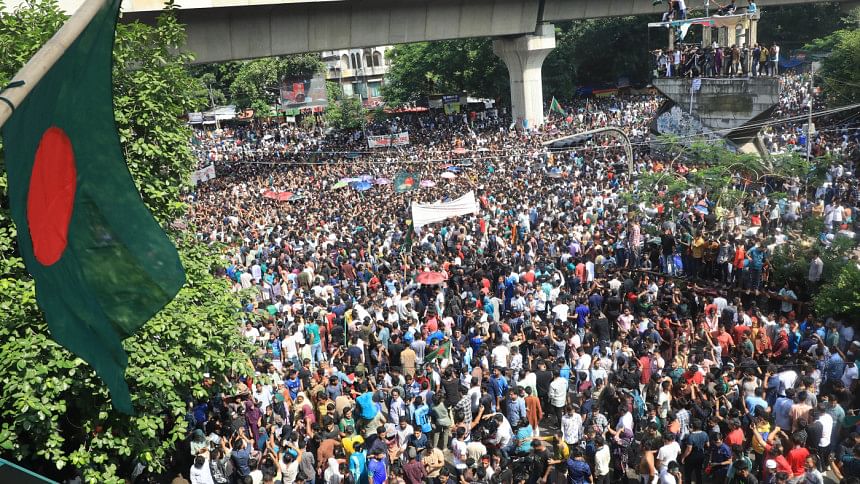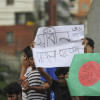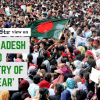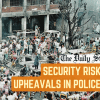One month after the new beginning

If we tried to retrace all our steps to August 5, the day when the will of the people won and when 15 years of a repressive, autocratic rule ended, it would be a dizzying experience. Of course, the momentum for August 5 really sped up from July 15 when the quota reform movement took its revolutionary turn.
On that day, protesting university students were brutally beaten up by Chhatra League. The old formula of using brute force whenever there was any dissent royally backfired. The bloodied faces of fellow students that included female students, the images of which were furiously shared on social media, unleashed something that we never thought possible. It was when the students decided that it was time to fight back. And fight they did, not with bullets or machetes as their attackers used, but with fearlessness and a sense of justice. On July 16, the day Abu Sayed made history by standing with hands outstretched in defiance of the policemen who kept on shooting at the unarmed university student, everything changed and set the tone for what would follow.
From the government's side, a leader utterly blinded by her own hubris and the glaring disconnect with her own people was laid bare. It caused Sheikh Hasina to abuse the state machinery once again, using maximum force by the police and Border Guard Bangladesh (BGB) to crush the students' spirit, resulting in mindless killings of at least 800 protesters and bystanders (including little children). But instead of quelling the spirit of dissent, these unconscionable acts ignited a thirst for freedom that spread like wildfire to all campuses all over the country, reaching the hearts of ordinary people who were stupefied to see students, the future of the country, being so brutally gunned down. Thus, on August 5, despite the horrific level of deaths and injuries of people, when it was clear that the autocrat who had shown her worst and most cruel side had fled through the backdoor of her grand office, the jubilations on the streets were as spontaneous as they were contagious. It was the united struggle of the people that culminated in victory.
From that pivotal moment, the subsequent events in the next 30 days have been just as dramatic.
Our emotions have been on an insane roller coaster ride. Horror, disbelief, anger, grief, gratitude, relief, uncertainty—all these feelings have been jumbled together into an impossible knot that desperately needs untangling. We are, if you will, in post-traumatic stress and events around us are not allowing us to breathe as freely as we had hoped.
No doubt, to have an iconic figure like Dr Muhammad Yunus as the leader of the interim government has given the people a sense of great relief. He is someone who has universal acceptance, and students and ordinary people are elated to be able to finally openly express their respect and love for the Nobel laureate. The speech he delivered on August 25 was full of genuine compassion, empathy, honesty and humility, virtues we have not seen in a leader for many decades.
He also frankly pointed out the challenges before us as we try to heal a country left in tatters after 15 years of misrule. He appealed to people to help him and his team to rebuild the country. He called for national unity—a call echoed by the student leaders and editors of major media houses. Many of his advisers are well-respected members of civil society. The public perception is that they are good, honest individuals who are interested in nation-building, not accumulating wealth through abuse of power.
One laudable move of the interim government has been to try to rein in the out-of-control corruption of the financial sector. In line with the finance adviser's vow to not spare big loan defaulters, the interim government has instructed the central bank, which has a new governor, to stop all concessions and rescheduling facilities given to loan defaulters, which has actually encouraged this continuous bleeding of the banks. The government has tasked a committee to formulate a white paper on the economy that will, among other things, review the energy sector's foreign loan agreements and other contracts. Curbing money laundering, aiming for accountability and transparency in the financial sector, is a breath of fresh air after years of financial haemorrhaging by the Awami League government's "friends and family."
In this month, we have also witnessed remarkable scenes.
With no police on the streets for days after August 5, and incidents of arson, vandalism and robbery being reported all over the country, a sense of community that had long become extinct emerged. Residents became protectors of their neighbourhoods, staying up all night in shifts to guard their communities. In many instances, students came to help. In fact, when there was news of Hindus being attacked, their temples desecrated and homes ransacked, students, including those from local madrasas, stayed vigilant all night to protect them.
For many days, there were no traffic police, and the students quickly mobilised themselves to handle the gridlocks, refusing to allow anyone to break traffic rules.
To test our resilience further came the devastating floods, drowning villages in several eastern districts. Here again, the students spontaneously rose to the occasion, mobilising relief at the TSC and taking it to flood victims, often risking their lives. The people, inspired by the patriotism and sense of solidarity of the students, showed their generosity through substantial donations and relief efforts.
But the other side of these 30 days indicates the mess the last regime has left us with and how much work we have to do. The work of the interim government has been constantly impeded by a series of untoward events—some done deliberately. While the uprising was victorious in ousting a fascist regime, it also gave many groups the idea that they now had a licence to demand whatever they wanted and do whatever they felt like doing, especially in the absence of law enforcers on the ground.
The Ansar protests, which turned violent on August 25, with students being attacked and some Ansar members injured, have shown how volatile the atmosphere still is. Over the last few weeks, workers of garment factories, shoe factories and pharmaceuticals, and most lately doctors of public hospitals (after doctors were attacked at the DMCH when a patient died) have gone on strikes; factories, buildings and homes of individuals connected to the former regime have been vandalised and set on fire. Meanwhile, in a bid to "purge" all corrupt elements of the past regime, mob justice has taken over; there have been forced resignations of principals, teachers, VCs and public officials, and indiscriminate filing of murder cases against individuals because of their affiliation with the ousted government. Moral policing in the name of religion has also reared its ugly head. All this has created a feeling of unease and uncertainty among people and a sense of impunity among those who want to cause mischief.
While the advisers of the interim government, as well as the student leaders, have called for an end to such acts, these calls should have been backed by prompt action. Security of people and property should have been ensured from day one, which it was not. With the police still reluctant to do their job, other forces such as the army could have been deployed much earlier before these situations went out of control.
Such criticisms are valid, and we expect the interim government to be more efficient in restoring law and order and seeking justice for the victims of the killings by the former regime. Corrupt individuals, be they members of the former government or private citizens who were its illegal beneficiaries, must be punished for the crimes they have committed. They must, however, be accorded due process and not become victims of legal manipulations reminiscent of the AL regime.
The students have entrusted the interim government to carry out necessary reforms that can usher in a Bangladesh that reflects their aspirations and those of the people. As citizens of this country, we should be immensely grateful to the students for giving us the opportunity to dream again, to breathe freely without fear. But the students, too, have a responsibility to show the maturity, restraint, and tolerance needed to realise these dreams. They must live up to the ideals of democracy, freedom and unity for all citizens—not just through words, but actions. They must always be mindful that they do not make the same mistakes as those they have ousted.
Aasha Mehreen Amin is joint editor at The Daily Star.
Follow The Daily Star Opinion on Facebook for the latest opinions, commentaries and analyses by experts and professionals. To contribute your article or letter to The Daily Star Opinion, see our guidelines for submission.

 For all latest news, follow The Daily Star's Google News channel.
For all latest news, follow The Daily Star's Google News channel. 











Comments